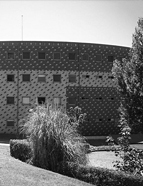

Although the University, the City and the North of the country could never have come to terms with the School's disappearance, it was only in the post-war period that there was any kind of continuous movement towards the reappearance of the FL/UP. The most frequently cited is centred around 1947, and occurred with the merger of the University of Porto (Rector Amândio Joaquim Tavares, 1900-1974, lecturer in Medicine, in office from 1946 to 1961), the City Council (Mayor Luís José de Pina Guimarães, 1901-1972, also a lecturer in Medicine) and the Institute of High Culture: This was the creation of the Centre for Humanistic Studies, annexed to the UP, where higher education open courses were taught, research was funded, and journals (Studium Generale, Cale) and monographs ("Amphitheatrum" collection) were published. There were also opinion campaigns, such as that of the evening newspaper Diário do Norte (1945 ss.) and speeches by Porto representatives (e.g., Urgel Horta) in the National Assembly.
Curiously, the FL/UP would (re)appear during the annus horribilis of the Regime: 1961, by legal diploma of 17 August (Decree-Law no. 45 864, of 17 August, DG, 1st series, No. 190, of the same date); at a time when there were few novelties in the field of Higher Education: the only other to occur at that time was the conversion of the Escola Superior Colonial [Colonial Higher School] into the Instituto Superior de Estudos Ultramarinos [Higher Institute of Overseas Studies] (1955) and then into the Instituto Superior de Ciências Sociais e Política Ultramarina [Higher Institute of Social Sciences and Overseas Politics], which was integrated into the Technical University of Lisbon (1960); when Rector Amândio Tavares and Minister of Education Francisco de Paula Leite Pinto (1902-2000) who, since 1955, had been at the helm of a somewhat more 'buoyant' - although not always consistent - policy for the sector, were no longer in office; and when one of the most conservative governments of the post-war period was in office, after two reshuffles following the Abrilada of that year (an attempt by a sector of ministers and military commanders, led by the Minister of Defence Júlio Botelho Moniz [1900-1970], to remove Salazar from office); In August 1961, Manuel Lopes de Almeida (1900-1980), professor of History at the University of Coimbra, was appointed Minister of Education and Carlos Eduardo Bastos de Soveral (1920-2007), a History and Philosophy graduate, who was also an assistant at the FL/UL and Reader at Spanish universities and would also lecture at the restored School (1963-1968), took up his post as Under-Secretary of State.
